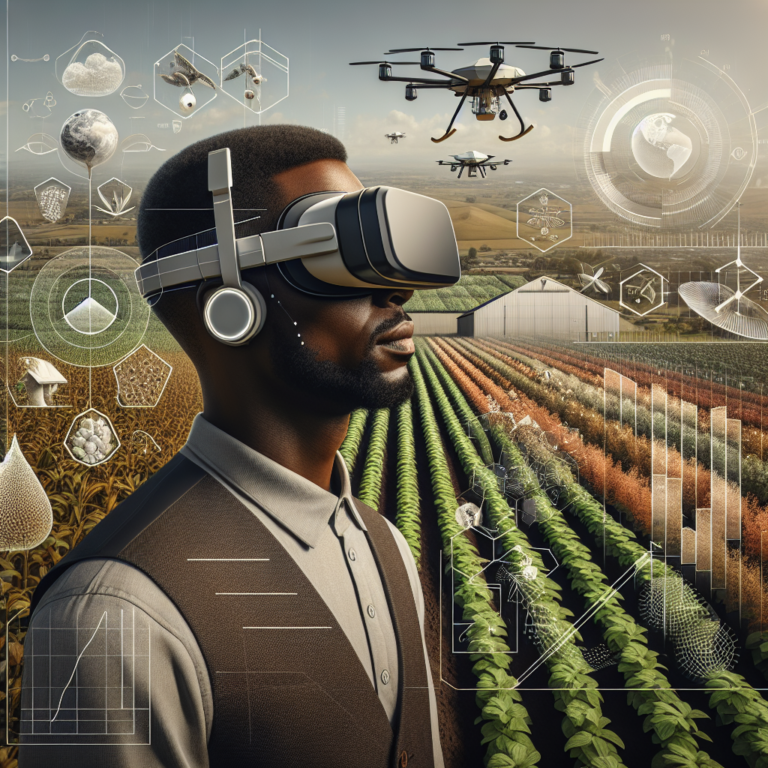Revolutionizing Agriculture: The Power of Immersive Technologies in Precision Farming 🌱
Understanding Immersive Technologies in Agriculture
XR Precision Farming : The agricultural sector has witnessed a remarkable transformation thanks to the integration of immersive technologies like Extended Reality (XR). This umbrella term encompasses Virtual Reality (VR), Augmented Reality (AR), and Mixed Reality (MR). These innovative tools foster a seamless blend of physical and digital environments, paving the way for a more efficient and productive farming landscape.
The Role of XR in Precision Farming
As the global population continues to surge, the necessity for sustainable and efficient agricultural practices has never been more critical. Precision farming leverages XR technologies to enhance crop management, livestock monitoring, and land optimization, allowing farmers to make informed decisions that improve yield while minimizing resource waste.
1. Data Visualization and Analysis
One of the primary benefits of XR technologies in agriculture is the ability to visualize complex data in an intuitive manner. Through the use of AR and VR, farmers can:
- Analyze soil conditions and moisture levels in real-time.
- Visualize crop health through 3D imaging.
- Evaluate the impact of weather patterns on crop performance.
With these enhanced insights, farmers can recognize potential problems before they escalate, facilitating timely interventions that improve overall productivity.
2. Training and Skill Development
Training is a vital component for success in the agriculture sector. XR technologies offer immersive training experiences that help farmers build essential skills without the risks associated with actual farming operations. Some advantages include:
- Safe environments to practice equipment handling and field management.
- Access to expert-led simulations for best practices.
- Interactive learning experiences that boost engagement and retention.
This innovative training approach ensures that farmers are better equipped to face the challenges of modern agriculture.
The Benefits of XR in Agriculture
Adopting XR technologies in agriculture presents numerous advantages that contribute not only to individual farms but to the agricultural landscape as a whole.
1. Increased Efficiency
Precision farming with XR enables farmers to utilize resources more effectively by:
- Making data-driven decisions that enhance crop management.
- Reducing waste and overuse of fertilizers and pesticides.
- Allowing for optimal irrigation strategies based on real-time analysis.
2. Enhanced Yield and Quality
Through accurate monitoring and rapid response to changes, XR technologies aid in maximizing both yield and the quality of crops. Farmers can closely track:
- Variables such as temperature, humidity, and soil health.
- Pest and disease outbreaks, enabling prompt action.
- The effectiveness of different farming techniques to choose the best practices.
3. Cost Reduction
The integration of XR in precision farming can lead to significant cost savings by:
- Reducing labor costs through automation and remote monitoring.
- Minimizing input costs by using resources judiciously.
- Avoiding losses associated with crop failures through timely interventions.
Challenges of Implementing XR in Agriculture
While the benefits of XR technologies are enticing, there are challenges to consider as well. Understanding these challenges is crucial to fostering successful integration:
1. High Initial Costs
The upfront investment in XR technology can be significant, from purchasing high-quality hardware to software licenses. Small and medium-sized farms may struggle to afford these costs initially, limiting widespread adoption.
2. Technical Expertise
Utilizing XR technologies effectively requires a level of technical expertise. Farmers may need extensive training to use these advanced tools proficiently, which can deter adoption. Bridging this knowledge gap is essential for the effective deployment of XR solutions.
3. Data Privacy Concerns
As with any technology that relies on data collection, concerns about data privacy and ownership arise. Farmers must navigate regulations while ensuring their sensitive information remains secure.
The Future of XR in Agriculture
The trajectory of XR technologies in agriculture is promising, as continued advancements in artificial intelligence (AI) and machine learning complement XR capabilities. Future developments may include:
- Enhanced AR applications providing real-time data overlays in the field.
- Integrations with autonomous machinery for fully automated farming systems.
- Remote farm management capabilities through advanced VR interfaces.
The future of farming will likely involve a synergistic approach where technology and human expertise work hand in hand to solve pressing agricultural challenges.
Real-World Applications of XR in Agriculture
Several innovative solutions are currently transforming the agricultural landscape through XR, including:
1. Smart Glasses for Field Workers
Wearing smart glasses equipped with AR can guide field workers by displaying crucial information—such as planting schedules or disease symptom descriptions—directly in their field of vision, enhancing productivity and accuracy.
2. Virtual Farm Tours
Farmers can leverage VR to offer immersive tours of their operations, providing stakeholders, such as investors and consumers, with a unique insight into farming practices. This transparency helps in building trust and understanding about sustainable practices.
3. Drones and XR Integration
Drones equipped with XR capabilities allow for aerial surveys of crops, mapping fields, and detecting issues from above. They enhance the precision of data collection, ensuring farmers receive valuable insights.
In conclusion, the adoption of immersive technologies in agriculture is reshaping precision farming. By leveraging XR, farmers can not only boost their productivity but also pave the way toward a more sustainable future for the entire agricultural sector. 🌍🚜




0 Comments